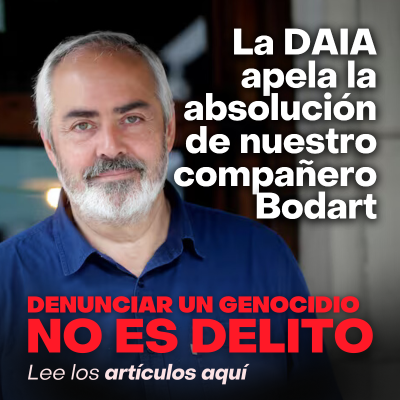Desde Moscú, Kazimierz Kryzhich
Inmediatamente después de la invasión militar de las tropas rusas en Ucrania, una ola de protestas contra la guerra se extendió por toda Rusia. Estos no fueron solo mítines y manifestaciones, sino también peticiones masivas de ciudadanos rusos, llamamientos públicos y cartas abiertas de conocidas figuras de la cultura y el arte, líderes de la oposición política, activistas sindicales y laborales, representantes empresariales y numerosos piquetes de la gente común.
La guerra fue condenada por varios partidos, incluso algunos diputados fueron expulsados del partido del estalinista pro-Putin, Zyuganov, y privados de sus mandatos. Las autoridades rusas, con una clara experiencia en la represión de las protestas populares y la destrucción de la sociedad civil en Bielorrusia, reaccionaron de inmediato con represiones masivas.
El 3 de marzo, la Oficina del Fiscal General de Rusia declaró que al participar en protestas contra la guerra, los rusos “se involucran en las actividades de organizaciones radicales, cuya participación implica responsabilidad penal en virtud de la Parte 2 del art. 282.2 del Código Penal de la Federación Rusa” (participación en las actividades de una organización extremista). Castigo: una multa de hasta 600 mil rublos o prisión por un período de 2 a 6 años.
El 4 de marzo, la Duma Estatal y el Consejo de la Federación adoptaron proyectos de enmiendas al Código Penal de la Federación Rusa, que introducen multas y responsabilidad penal para los rusos por difundir «información falsa a sabiendas» («falsificaciones») sobre el ejército ruso, por llamamientos de acciones anti guerra, así como a favor de sanciones contra Rusia. La Duma estatal también adoptó en primera lectura un proyecto de ley del gobierno que permite que la oficina del fiscal obtenga acceso a datos personales, no solo como parte de la supervisión, sino también, en el desempeño de otras funciones.
El gobierno ruso desató todo el poder de su aparato represivo y su máquina de propaganda sobre el naciente movimiento contra la guerra. Amenazas de muerte, palizas, detenciones, arrestos y juicios obligaron a muchos rusos a huir del país, y los que se quedaron tuvieron que abandonar las formas legales de lucha y activismo contra la guerra.
Hoy se puede afirmar que en Rusia, como en Bielorrusia, todas las instituciones de la sociedad civil han sido destruidas. Cualquier manifestación de una posición de desacuerdo con la política del Kremlin es inmediatamente procesada y severamente castigada. Las etiquetas de “enemigo del pueblo”, “traidor”, “espía”, “extremista”, “neonazi”, y otras, son ampliamente utilizadas por la propaganda rusa para destruir y desacreditar a cualquiera que declare su oposición a la guerra.
La fascisización de la sociedad rusa está creciendo rápidamente, cubriendo todas las esferas de su existencia, desde los jardines de infancia, hasta las instituciones de la máxima dirección política del país. Por el momento, es difícil que haya protestas populares masivas en tales condiciones. Además, psicológicamente, muchos rusos aceptan la «operación especial» de Putin, compensando así la inferioridad de la vida en la pobreza y la anarquía con la idea de la “grandeza de la Nación Rusa”. Sin embargo, este apoyo puede colapsar en un instante, tan pronto como se comprenda realmente que la guerra con Ucrania puede prolongarse durante mucho tiempo. Ya se puede observar que el descontento con la guerra entre la población es cada vez más evidente, a partir de las sanciones. Cierres de plantas, despidos de trabajadores, escasez de bienes importados, aumento de los precios de los alimentos y la energía, recortes en el gasto social, el flujo constante de soldados rusos asesinados y mutilados por la guerra de Putin, obligan a muchos a preguntarse: ¿Para qué son estos sufrimientos y privaciones?
La lucha del pueblo ruso contra la camarilla fascista de Putin no se ha detenido. Cada vez más, se pueden ver más símbolos de “Rusia Libre”, así como, folletos y carteles contra la guerra en las ciudades rusas. En varias regiones de Rusia, se están creando comités clandestinos contra la guerra, el movimiento se está estructurando gradualmente, adaptándose a las condiciones del terror del Kremlin.





